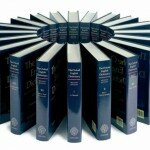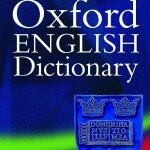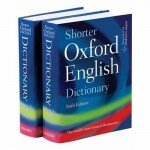Oxford Dictionary
October 11, 2025 – 8:27 pm
 It will not be inapposite to say that Oxford English dictionary is the progenitors of English Language and literature. If you have a problem regarding some word in the English language, Oxford English dictionary will provide you with the best solution.
It will not be inapposite to say that Oxford English dictionary is the progenitors of English Language and literature. If you have a problem regarding some word in the English language, Oxford English dictionary will provide you with the best solution.
According to the publishers of Oxford English dictionary, a single person will take 120 geezer hoods to type all 59 million words of Oxford English dictionary; he will take about 60 calendar years to proofread it; and if an electronic version of Oxford English dictionary is created, it will occupy 540 megabytes of space to store it. Oxford English dictionary consists of 301,100 words.
In the early stages, the Oxford English dictionary was not associated to Oxford University. It was an idea of small groups of prodigies in London. It was a philological project conceptualized by Frederick Furnivall, Herbert Coleridge, and Richard Chenevix Trench, in London. These people were not satisfied with the English dictionaries, available at that time. Frederick Furnivall, Herbert Coleridge, and Richard Chenevix Trench formed an “Unregistered Words Committee”, in June 1857. The main functions of this committee were to search unlisted and unspecified words, lacking in the current version of dictionaries. In November 1957, Richard Chenevix Trench submitted his report. This report did not contain the list of unregistered words, but consist of the study On Some Imperfections in our English Dictionaries. In this report, Richard Chenevix Trench specifies seven inadequacies of the dictionaries, present at that time. These shortcomings were:
- Incongruous coverage of families of allied words
- Abridged description of outmoded words
- History of obsolete senses of words often omitted
- Sparse use of good elucidative quotations
- Imprecise dates for earliest use of words
- Space wasted on irrelevant or superfluous content
- Inadequate discernment among synonyms.
The philological society comprehended that the number of unlisted words would be far greater that the number of words in the English dictionaries, of that time. Now, after the submission of the report by Richard Chenevix Trench, and considering the above facts, the philological society shifted their work from only words that were not already in English dictionaries to a more panoptic project. Richard Chenevix Trench suggested that there was a need of a true comprehensive dictionary. The philological society, on January 7, 1858, adopted the idea of a true comprehensive dictionary. Books were allotted to volunteer readers. And then copy to quotation slips passages exhibiting actual word usages was created. And finally, in 1958, the philological society agreed to a project, named “A New English Dictionary on Historical Principles”.



Richard Chenevix Trench played a key role in early stages of the project. However, he was not able to give the right time required for the project, so he withdrew himself from the project, and Herbert Coleridge became the first editor. On 12th May, 1860, Coleridge’s dictionary plan was published and his team started the research. He made his house his first office. In May 1861, Herbert Coleridge died of tuberculosis.
After that, Frederick Furnivall became the editor, and took all the work in his hands. However, Frederick Furnivall was not able to keep his workers spurred. He understood the need of a proficient excerpting system, and finally started several precursory projects.
In 1870, Furnivall approached James Murray to succeed him for the post of the editor. In the late 1870s, Furnivall and Murray turned to several publishers for publishing their dictionary. And at last, in 1878, Oxford university press agreed with Furnivall and Murray to publish this colossal project. Finally, after 20 years, the historic dictionary got its publisher and 50 years later, the dictionary was complete.
Until date two editions of Oxford dictionary have been released, and third edition is to be released in the coming time. Oxford dictionary is an extensive source of Head words, Enunciation, Parts of articulation, Homonym numbers, Variant forms, Amalgams, Initialisms, Abridgements, Affixes, Counterfeit words and many more. CD version of Oxford dictionary has also been launched. You can find all above mentioned things in that CD ROM.
It would not be wrong to say that language is incomplete without Oxford dictionary. It is Oxford dictionary only, which is ready to help us in language, whenever we have some problem.
Tags: origin of dictionary, origin of oxford dictionary, Oxford Dictionary